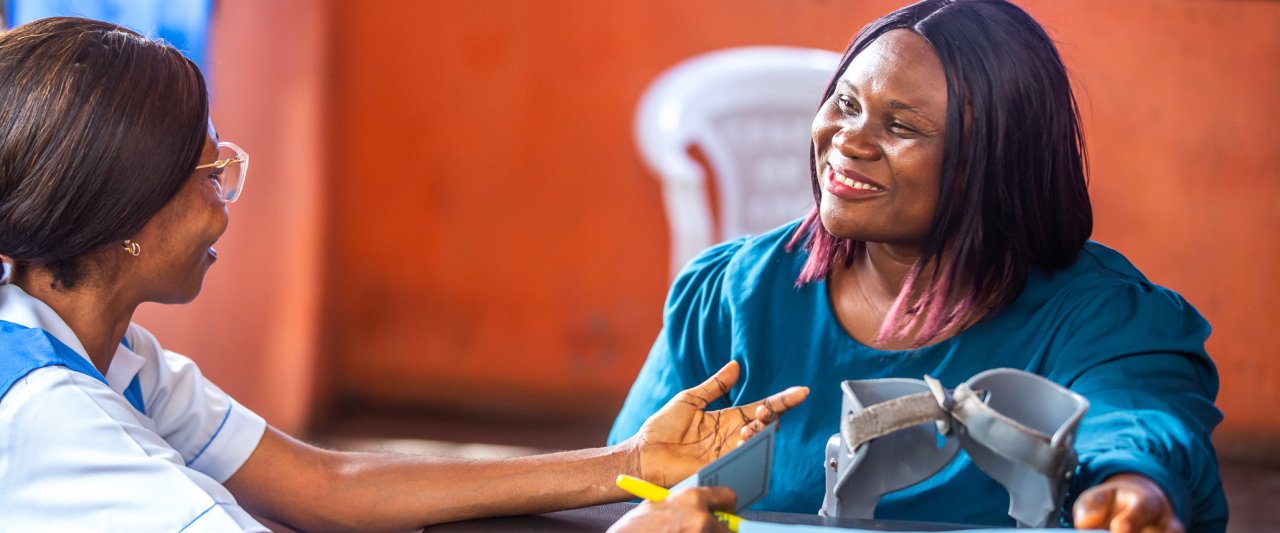Disability justice is not a side issue for Ipas—it is essential to achieving our mission. People with disabilities face some of the greatest barriers to sexual and reproductive health and rights, including abortion, and as a global reproductive justice organization focused on these issues, we have a responsibility to confront those barriers head-on. In 2025, Ipas publicly affirmed this truth by submitting a comprehensive set of commitments to the Global Disability Summit (GDS) focused on disability inclusion across all areas of our work.
At the third annual Global Disability Summit, held in April 2025 in Berlin, over 4,700 participants from 160+ countries came together to drive progress on disability inclusion. Co-hosted by Germany, Jordan, and the International Disability Alliance, the summit concluded with the Amman-Berlin Declaration and 800 new commitments—including Ipas’s.
Ipas’s commitments align with key articles of the Convention on the Rights of Persons with Disabilities (CRPD), centering the right to health, political participation, and international cooperation and reinforcing that our work is grounded in international human rights law. We aim to help dismantle systemic discrimination, and our commitments respond directly to recent UN recommendations calling for stronger, consultative partnerships with Organizations of Persons with Disabilities (OPDs).
Top image: Ipas-trained nurse Umoh Jennifer discusses family planning options with Ehigiamusee Favour, a teacher in Edo State in Nigeria whose access to sexual and reproductive health and rights (SRHR) improved after Ipas programming. © Ipas/Sophoto Studios
DORIS IKPEZE, program manager for the Ipas Nigeria Health Foundation, co-creator of Ipas’s Global Disability Summit commitments
Global commitments by Ipas DRC show local partners that we’re serious about breaking systemic barriers to sexual and reproductive health and rights—especially for people with disabilities affected by conflict and crisis in eastern DRC.”
DR. MIKE MPOYI, Ipas DRC national program manager, co-creator of Ipas’s Global Disability Summit commitments
Our network-wide commitments
Ipas pledges to partner with ODPs at all levels, ensuring people with disabilities are actively involved in shaping our work, and update our tools and training to reflect the latest evidence on inclusive abortion and contraception care. We will embed disability justice across our internal systems with a Gender Equality and Social Inclusion (GESI) audit, completed by June 2025, with improvements implemented by 2027. These efforts are rooted in our Feminist Principles for Partnership and aim to build truly sustainable, disability-inclusive abortion ecosystems.
Our advocacy strategy is also evolving. By 2030, we will:
-
- Integrate disability inclusion into all advocacy and abortion rights strategies
- Actively engage in disability-led spaces and coalitions
- Support disability-led initiatives through endorsements and joint statements
- Include disability and abortion rights in United Nations (UN) submissions
“When we think about the work Ipas does with other movements, like climate justice or disability justice, it continues to be important for us to do this work in partnership with existing organizations, experts, and those with lived experience,” notes Brittany Moore, Ipas technical research advisor and co-creator of the Ipas GDS commitments. “As ‘partners in reproductive justice,’ we strive to honor existing expertise and collaborate, not displace.”
Putting principles into practice in Nigeria and the Democratic Republic of Congo (DRC)
Our commitments represent a shift in how we design and deliver our programs. Across Ipas’s global network, teams are turning this vision into action. In Nigeria and the DRC, Ipas has made the following national pledges to the Global Disability Summit.
“Ipas’s work with OPDs in the DRC has evolved—from making services disability-sensitive to fully integrating disability inclusion to break inequalities in accessing care, especially abortion, contraception, and gender-based violence care,” says Mpoyi. “We learned the best way to reach their communities is to co-create, implement, and monitor together. Today, SRHR-specialized OPDs are shaping policies and accountability platforms to align services with their needs.”
In the Democratic Republic of Congo, Ipas commits to:
- Develop a policy advocacy strategy for disability-inclusive sexual health and rights (SRHR) under Universal Health Coverage by 2027.
- Measure and share the impact of current programs on women and girls with disabilities by 2026.
- Integrate disability-inclusive content into provider-training curricula and disseminate new modules with government and civil society by 2027.
- Partner with Congolese OPDs to submit three donor proposals addressing access gaps, policy advocacy, and disability data in seven provinces.
- Support two other Ipas country teams in expanding disability-inclusive programs by 2027.
- Ensure inclusive hiring and working environments, and train 30 staff on disability-inclusive Values Clarification for Action and Transformation (VCAT) by 2026.
“At Ipas Nigeria, the former approach was for disability rights organizations to submit planned activities for our support,” says Ikpeze. “Now, we co-design programmatic activities—empowering them to design from a more sustainable mindset, using the Ipas sustainable abortion ecosystem approach and social norms change tools.”
In Nigeria, Ipas commits to:
- Co-design a new project with the Deaf Women Association of Nigeria that explores the intersection of AI, self-care, and gender-based violence.
- Collaborate with OPDs to co-develop and implement proposals advancing SRHR and disability inclusion by 2030.
- Apply the Feminist Accessibility Protocol across all programs—covering costs for accessible participation and ensuring inclusion from the outset.
- Support two additional Ipas nodes in integrating disability inclusion by 2027.


